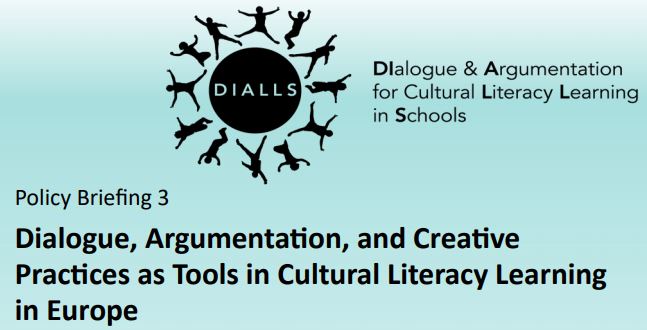|
Digital meets Culture https://www.digitalmeetsculture.net/article/dialls-dialogue-and-argumentation-for-cultural-literacy-learning-in-schools/ Export date: Wed Mar 4 18:37:43 2026 / +0000 GMT |
DIALLS - Dialogue and Argumentation for Cultural Literacy Learning in Schools  The DIALLS research project (Dialogue & Argumentation for Cultural Literacy Learning in Schools), funded by the European Commission's H2020 Programme (grant no 770045) has published its third and final policy brief entitled Dialogue, Argumentation, and Creative Practices as Tools in Cultural Literacy Learning in Europe. The DIALLS research project (Dialogue & Argumentation for Cultural Literacy Learning in Schools), funded by the European Commission's H2020 Programme (grant no 770045) has published its third and final policy brief entitled Dialogue, Argumentation, and Creative Practices as Tools in Cultural Literacy Learning in Europe.The policy brief is based on DIALLS' development of a Cultural Literacy Learning Programme for children and young people and the analysis of the Programme's outcomes. The policy brief includes seven recommendations for the authors of future education policies in Europe about how to improve constructive interaction and mutual understanding. Its summary states: "Cultural literacy learning is a key to advance tolerant, empathetic, and inclusive attitudes towards diversity and differences. It is important that the EU strengthens its current education initiatives and policies and creates new ones emphasizing cultural literacy learning based on dialogue and argumentation as core skills for participating in a pluralistic society. These initiatives and policies should recognize creative practices as an effective arena for teaching empathy. The EU's education policies and initiatives could better acknowledge young children and early education." The DIALLS project organized an online policy round table on 25 May 2021 at 10:00-11:00 CEST in Zoom. In this round table, the project leader Dr. Fiona Maine from the University of Cambridge, UK, and Dr. Tuuli Lähdesmäki, Dr. Katja Mäkinen, and Dr. Aino-Kaisa Koistinen from the University of Jyväskylä, Finland, will introduce the project and the core recommendations from its three policy briefs dealing with European education policies and cultural literacy. Information about DIALLS can be found in the project's flyer. Further information about DIALLS activities is available on the project website. |